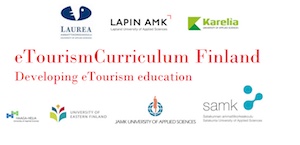The course is open for sign-in and the deadline for sign-up is 23.5.2016.
DETAILED IMPLEMENTATION PLAN
Code, name and number of ECTS of study unit
TRA8PO038, Electronic distribution in tourism, 5ECTS
Language of course
English
Virtuality 100% Activity Holidays
Recommended academic year 2nd year
Teachers in charge
Alexandre Kostov, Haaga-Helia UAS
Objectives
This course provides students a wide perspective on the topic of electronic distribution in tourism. This course covers important topics in the field and creates an understanding of connections and contents on the digital tourism landscape. After the course the student is able to explain the evolution, role and features of Global Distribution Systems as travel intermediaries and understands the role and function of electronic distribution channels in tourism. Upon successful completion of the course, the student has the skills and knowledge needed for successful electronic distribution channel management and understands the difference between distribution channels in travel business and will be able to choose right distribution channel for personal or business purposes. The student gets familiar with the future trends in tourism product distribution – NDC.
Content
This course concentrates on the electronic distribution of hospitality and tourism products.
Study topics include:
- distribution agents and intermediaries
- channel requirements and optimization
- pricing integrity
- competitive distribution analysis and justification
- integration of marketing in distribution channels
Key concepts include:
- Computer reservation systems(CRSs)
- Global Distribution Systems (GDSs)
- GDS New Entrants (GNEs)
- New Distribution Capability (NDC)
- Tour operators
- Tour wholesalers
- Travel retailers
- Travel management company (TMC)
- Online travel agents (OTAs)
- Channel Managers
- Business Travellers needs
Prerequisities
Student has completed the basic studies in tourism.
Pedagogical arrangements
Online lectures
Independent study in network environment.
An individual assessment assignment
The assessment of one’s own learning
Materials
Online course materials
Buhalis, D (2003) eTourism – Information technology for strategic tourism management, Prentice Hall, Harlow, UK.
Inkpen, G (1998) Information Technology for Travel and Tourism, Addison Wesley Longman, Essex UK.
Egger. R, Buhalis, D (2008) eTourism case studies: management and marketing issues, Butterworth-Heinemann, Elsevier, UK.
Pierre J Benckendorff, Pauline J Sheldon, Daniel R Fesenmaier (2014) Tourism Information Technology, 2nd Edition, CABI, UK.
Assignments
The course is done completely online and divided into five modules, each 1 ECTS. The student can choose one module or all. Each module will have one assessment assignment.
ASSESSMENT PLAN
Assignments 100%
Grading Scale
Excellent (5) – Satisfactory (1), Fail
General Assessment Criteria
Satisfactory 1
The student has limited understanding of e-distribution basic functionalities
The student lacks sufficient skills in e-distribution.
The student can under supervision perform basic management of e-distribution channels.
With great difficulty and under strict supervision, the student can work with the assignments. S/he poorly applies the theoretical background to the text and somewhat fails to document her/his work process.
Good 3
The student has an adequate understanding of e-distribution role and functionalities
The student demonstrates satisfactory skills in e-distribution channel management.
The student can work with the assignments quite professionally S/he can somewhat apply the theoretical background to the work. S/he can document her/his working process.
Excellent 5
The student has an advanced understanding of e-distribution functionalities and is able to choose the right distribution channel for personal or business purposes.
The student has the skills and knowledge needed for successful electronic distribution channel management.
The student can work with the assignments very professionally. S/he can fully apply theoretical background to the work. S/he can document her/his working process and analyze & evaluate the different choices at a highly professional level.
To be taken into account
Software for detecting plagiarism is used when returning assignments.
